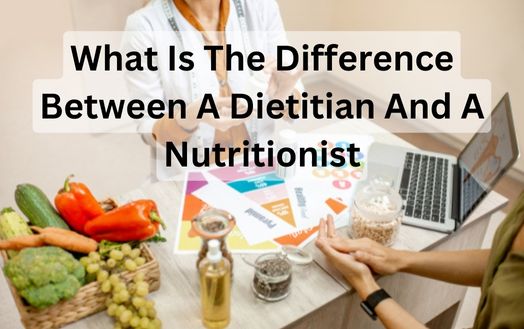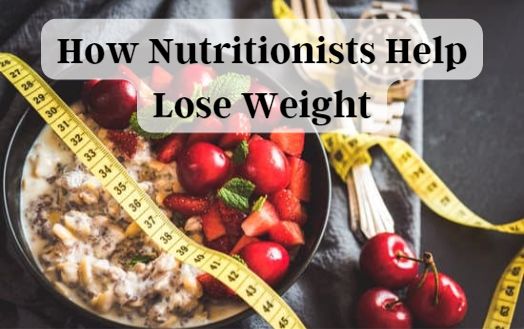Are dietitians and nutritionists different? It’s a crucial health question. The terms are often confused, but they’re not! We’ll compare these two professionals so you can get the care you need for optimal health. Dietitians and nutritionists both know a lot about food and its effects, but they work differently. They pursue different goals despite having similar ones. Let’s examine each professional’s approach to clients and determine which one might suit you best.
Understanding the differences between dietitians and nutritionists can help people manage chronic conditions or improve their health through diet. You can determine who will best meet your needs by reviewing their skills, credentials, experience, and more. Read this article in order to know what is the difference between a dietitian and a nutritionist.
Understanding The Key Aspects Of Dietitians And Nutritionists
Dietitians and nutritionists are often confused. Both professions help people improve their diets, but they differ. Examine their differences. The state board of licensing requires RDs to have an accredited undergraduate degree in nutrition or dietetics and supervised practice hours. Some RDs are Certified Nutrition Specialists (CNS). These professionals provide medical nutritional therapy for disease prevention and management and teach clients how to choose healthy foods that fit their lifestyles. However, a nutritionist usually has a bachelor’s degree in nutrition science or a related field but is not licensed or regulated. Nutritionists educate people about diets, health, and wellness. Nutritionists can teach healthy eating classes, but they cannot diagnose diseases like RDs can. With this knowledge, we can examine the education requirements for dietitians and nutritionists.
Education Requirements For Nutritionist And Dietitians

Understanding each profession’s educational requirements helps distinguish dietitians from nutritionists. Dietitians must have an accredited nutrition degree and be registered with the American Dietetic Association (ADA). This requires 1,200 hours of supervised practice and an ADA exam. Nutritionists can have public health, physiology, biochemistry, or food science degrees. They need no professional certification. Depending on the job, many states require licensure. Dietitians and nutritionists practice differently. Dietitians have more training and can perform medical nutrition therapy or nutritional counseling, but nutritionists focus on dietary assessment and meal planning. Some specialize in sports nutrition or plant-based diets, while others offer general nutrition advice. Dietitians or nutritionists depend on your needs and goals. If their credentials meet your expectations, both can improve your overall wellbeing!
Job Description
Dietitians and nutritionists work in food and nutrition. There is a key difference. Dietitians are more educated than nutritionists. Dietitians need a four-year degree from an accredited university or college and a national exam to register with their provincial regulatory body. They counsel individuals on healthy eating and medical conditions. Nutritionists may hold diplomas or advanced graduate degrees, but they are not required to be certified or licensed. Nutrition specialists emphasize how our bodies use nutrients from food and beverages to ensure optimal health outcomes for clients and patients. They create personalized meal plans and research new diets and nutritional trends to help people achieve their wellness goals. Both professions help people make healthy food choices, but each has its own skills. Knowing these differences will help you choose the right candidate.
Areas Of Specialization

Dietitians and nutritionists specialize differently. Public-health nutritionists advise people on healthy eating. They can also create customized nutrition plans with clients. Dietitians specialize in sports nutrition, helping athletes and others improve performance through diet. Nutritional counseling and customized meal plans are typical. Both professionals help physicians treat patients with special diets in hospitals, clinics, nursing homes, and other medical facilities. There is some overlap between the two professions, but their specializations differ. Let’s examine how these specialists fit into nutrition science before moving on to medical roles.
Roles In Healthcare And Medical Settings
Dietitians and nutritionists are different but important healthcare professionals. Dietitians study food, preparation, and health. They advise people on healthy eating, create meal plans for people with chronic diseases or special dietary needs, monitor patient progress towards health goals, and educate patients about diet. Nutritionists examine diet and overall health. This includes researching nutritional needs for different life stages, such as pregnancy and old age; advocating for nutrition policy changes; creating educational programs; monitoring food safety regulations; and developing innovative nutrition-related health promotion methods. Dietitians and nutritionists collaborate in hospitals to provide comprehensive patient care. Dietitians provide one-on-one counseling, while nutritionists may work on research or population-wide diet improvement projects. When assessing and treating patients, they may work with doctors, nurses, pharmacists, and physical therapists. Dietitians and nutritionists can change lives by helping people make healthy food choices. In this new era of personalized medicine, where evidence-based strategies are used more than ever, these two disciplines will become increasingly intertwined, opening up exciting healthcare possibilities. In order to know what is the difference between a dietitian and a nutritionist.
Differences In Scope Of Practice

Nutritionists and dietitians both help people stay healthy through food and nutrition, but their scope of practice differs. Dietitians must have a bachelor’s degree from an accredited university program with supervised clinical experience, while nutritionists usually study nutrition science or public health. Dietitians are better than nutritionists at advising patients on special diets. They know how to tailor meal plans to age, gender, lifestyle, and medical conditions. Nutritionists instead focus on population-wide healthy eating patterns. Dietitians can provide immediate solutions to specific needs, but nutritionists look at how different foods affect health over time. Nutritionists and dietitians can teach others about healthy eating habits and reach the most vulnerable through community outreach programs. Each nutritionist has unique skills that help them succeed. The next section compares the salaries of these two careers to help you choose!
Salary Differences Of A Nutritionist And Dietitian

Nutritionists make much more than dietitians. Dietitians earn more than nutritionists because nutritionists require less training. Dietitians can diagnose illnesses, provide medical nutrition therapy, and customize meal plans for patients, while nutritionists can only advise. Certification requires specialized courses. Nutritionists can advise on diet but not diagnose or treat diseases. Most states only require a bachelor’s degree in human biology, chemistry, food science, nutrition, public health, and biochemistry. Nutritionists may earn more than dietitians, even though nutritionists require less schooling. Despite your qualifications, your pay may vary depending on where you work—a doctor’s office or an educational institution. Both nutritionists and dietitians help people understand how good nutrition affects health and well-being, but dietitians earn more.
Employment Outlook For Dietitians And Nutritionists
Dietitians and nutritionists are in demand. These professionals are helping people reach their dietary goals as healthy eating awareness grows. Three reasons:
- More companies are hiring APDs and CNSs.
- More people are seeking nutritional advice from experts to live healthier lives.
- Dieticians and nutritionists work in hospitals, clinics, schools, private practices, corporate wellness programs, government agencies, research institutions, food companies, and health clubs.
With so many options for qualified dieticians and nutritionists, it’s no wonder so many are interested in this career. Dietitians and nutritionists are in high demand, so educational programs for them have increased. This trend is expected to continue, making now the perfect time to pursue the professional credentials needed by both professions!
Professional Credentials Required For Both Fields
Dietitians and nutritionists differ in education and training. Dietitians typically complete internships or fellowships and an undergraduate degree from an accredited college or university. To register with their state’s licensing board, they must pass a national certification exam. Depending on their interests and career goals, nutritionists may have bachelor’s or master’s degrees. Most states require licensed nutritionists to counsel, consult, and teach about food and nutrition. Dietitians and nutritionists must complete specific degree program coursework to be licensed or registered. This includes biology, chemistry, biochemistry, physiology, anatomy & physiology, medical terminology, epidemiology & public health sciences, and other relevant courses. They must also take classes on the science of human nutrition, including how vitamins and minerals affect metabolism, how macro- and micronutrients affect health, how different diets can prevent diseases, and more, which are often offered as part of larger graduate-level degree programs in public health departments or medicine schools. Dietitians and nutritionists must pass a rigorous certification exam administered by national boards that regulate professional qualifications. State laws vary. After passing tests, professionals are certified by industry experts.
Certification Examinations

Certification exams distinguish dietitians from nutritionists. Nutritionists can choose a certifying organization, but dietitians must take the Commission on Dietetic Registration (CDR) exam.
- Academy of Nutrition and Dietetics: Certified Nutrition Specialist Exam
- ACSM—Registered Clinical Exercise Physiologist Exam
- Performance Improvement International: Credentialed Healthcare Professional Exam
- NSCA-CPT Exam
Dietitians must complete an accredited program with coursework in human anatomy, pathophysiology, biochemistry, food service management, nutrition education, counseling, and professional ethics before taking the CDR exam, while nutritionists can test after completing undergraduate studies in health sciences or other related fields. Some states also require continuing education credits for registered dietitians. Both professions offer holistic nutritional guidance and meal planning advice, but licensing requirements vary.
Licensing Requirements
After passing certification exams, dietitians and nutritionists must understand licensing requirements. Licensed dietitians must have an accredited university degree, professional education, and supervised practice. Dietitians must study food and nutrition science and clinical practices. However, while anyone can call themselves a “nutritionist,” some states require college-level nutrition coursework. Medical terminology, anatomy, physiology, disease management, and nutrition counseling techniques may also be tested for licensure. Finally, while each state regulates nutrition professional licensure, many states accept credentials from national professional organizations like the Academy of Nutrition and Dietetics (AND). These steps ensure that diets are scientifically tailored to individual needs for quality nutritional care. Let’s examine dietitians’ and nutritionists’ professional organizations.
Professional Organizations
Dietetics and nutrition focus on food, nutrition, and health. Nutritionists help people choose healthy foods and have degrees in nutrition or public health. Dietitians study food and nutrition science and have higher degrees than nutritionists.
The AND and ASN are the professional organizations for registered dietitians and certified nutritionists, respectively. Both organizations advocate evidence-based nutrition. They offer continuing education, networking, research grants, publications, certification programs, public information campaigns, and more.
Both groups require ethics and continuing education to maintain professionalism. These help healthcare professionals stay current and provide quality services to patients and clients. AND requires 75 hours of approved continuing education every five years to maintain membership.
Continuing Education Requirements

After discussing dietitians and nutritionists’ professional organizations, let’s discuss continuing education. Dietitians need different continuing education than nutritionists. Dietitians must complete an accredited nutrition or dietetics program and pass a Commission on Dietetic Registration exam, while nutritionists do not.
Both professionals must also continue their education in many states to stay current. Dietitians specialize in weight management, sports nutrition, clinical research, public health initiatives, business practices, culinary arts, and educational programming, while nutritionists focus on general food and nutritional needs. Their specialty evolves through continuing education.
Staying current in nutrition and dietetics helps practitioners provide quality care to patients seeking advice on their diets or other health issues. Dietitians and nutritionists can give clients evidence-based advice with the right continuing education credits. Therefore, these professions remain popular! Dietitians and nutritionists have many advantages.
Benefits Of Working As A Dietitian Or Nutritionist
Dietitians and nutritionists have rewarding jobs. Both professions have benefits, such as teaching healthy eating habits to others. Key advantages:
- Clinical Nutrition: Dietitians and nutritionists can advise patients with diabetes, obesity, and heart disease on their dietary needs because of their knowledge of clinical nutrition.
- Nutritional dietetics: Dietitians and nutritionists are experts in nutrition science and understand how food interactions affect health. They use this knowledge to tailor diets to individual nutritional needs.
- Nutrition Specialists: Dietitians and nutritionists tailor meal plans, lifestyle advice, and support to help people reach their health goals. Professionals with accredited degrees in either field can work alone or in a multidisciplinary healthcare team.
Dietitians can lead departments at hospitals or long-term care facilities, while nutritionists can specialize and earn more certifications. Take advantage of all the opportunities to succeed as a dietitian or nutritionist while improving global public health! Understanding the daily challenges dietitians and nutritionists face, such as time constraints due to increased demand for personalized services or limited compensation packages compared to physicians, is necessary to transition into their profession.
Challenges Faced By Dietitians And Nutritionists
Many confuse dietitians and nutritionists. Dietitians create personalized diets based on medical history and health status to help people change their lifestyles. They promote health and wellness with their nutrition expertise. Nutritionists may not have nutrition training.
Our fast-paced society challenges both professions. Internet access to diet information has led people to avoid registered dietitians (RDs). To provide evidence-based advice, RDs must stay current on nutrition and health research. RDs can struggle to keep up with new guidelines from various organizations.
Dietitians and nutritionists must keep learning how to help people improve their health through diet and lifestyle changes. One can better serve clients and stay competitive by learning this field.
Conclusion
In conclusion, dietitians and nutritionists both offer valuable insight into healthy eating. They can provide individuals with the knowledge needed to make informed decisions about their food choices. The main difference between a dietitian and a nutritionist is that dietitians are more highly regulated by the government than nutritionists. Dietitians must meet specific educational requirements in order to be licensed, while these same rules do not generally apply to nutritionists. Additionally, salary ranges for each profession vary significantly, as do the required malpractice insurance and continuing education credits. Ultimately, it’s important to consider what type of professional best suits your individual needs when deciding who to consult regarding your health. With research and thoughtfulness, you’ll be able to find an expert who can help you reach your goals. Now that you have read the article, you already know what is the difference between a dietitian and a nutritionist.
FAQ
What Types Of Foods Do Dietitians And Nutritionists Recommend?
Dietitians and nutritionists are invaluable resources for healthy eating and living. But which foods are recommended? Compare their diets.
First, dietitians and nutritionists offer advice on healthy eating. Dietitians specialize in food science, planning meals for people with allergies or medical conditions. However, nutritionists may give general nutritional advice rather than individualized plans.
Dietitians follow the American Heart Association diet guidelines (AHA). Nutritionists recommend plant-based diets that emphasize unprocessed whole foods with fiber, healthy fats, vitamins, and minerals. They may recommend supplements based on an individual’s needs.
Understanding their differences can help you set health goals. In conclusion, consulting a dietician or nutritionist depends on your goals.
Are Nutritionists And Dietitians Regulated By The Government?
Nutritionists and dietitians: government-regulated? If you need food advice, it’s a crucial question. Both professions are semi-regulated worldwide.
In the US, nutritionists must follow strict guidelines. Dietitians are more qualified than nutritionists and must be licensed by their state boards. In addition to having more qualifications, dietitians may work under the supervision of doctors or nurses in hospitals or clinics.
Most states require nutritionists to have a certification from an accredited program to prove their food science and nutritional knowledge. Dietitians counsel and plan meals, but nutritionists focus on public health issues. They promote healthy eating, lifestyle changes, and nutritious meal preparation.
Dietitians and nutritionists both help us eat better, but one focuses on patient care and the other on education. This distinction helps us choose qualified nutritionists.
What Is The Average Salary Range For Nutritionists And Dietitians?
Nutritionists and dietitians’ average salaries? We can help. Dietitians and nutritionists work together in healthcare, but they do different things. Dietitians create meal plans to meet nutritional needs, while nutritionists look at what people eat to help them reach their health goals. Both careers require science-based nutrition knowledge.
Experience, credentials, location, and employer all affect salaries. Nutritionists earn an average of $50,000 per year, according to PayScale’s latest survey. Dietitians earn more than nutritionists, with median wages between $45K and $91K and an average of $63K. Many employers offer bonuses or commissions for performance or referrals in addition to base pay.
If you love helping people eat healthier, either career can be rewarding. Because trends change, continuing education is essential for nutritionists and dietitians. With hard work, this could lead to one of today’s most sought-after careers!
Do Dietitians And Nutritionists Need Malpractice Insurance?
Do nutritionists and dietitians need malpractice insurance? Anyone considering these careers should ask this question. Malpractice insurance can give clients peace of mind if they feel wronged or given bad advice. Thus, dietitians and nutritionists must understand their coverage needs.
First, malpractice coverage for healthcare professionals is state-specific. Some states require all healthcare providers to carry liability insurance. Check with your local governing body to see if you need this coverage before practicing.
The Academy of Nutrition and Dietetics, among others, offers professional liability insurance for dietitians and nutritionists. This policy offers nutritionists specialized protection at a higher cost. Before hiring, most employers require malpractice insurance.
So whether you’re just starting out as a dietitian or nutritionist or have already established yourself professionally, malpractice insurance is important to protect against unexpected events. Every practitioner should prioritize quality client care, and being properly insured can give you the confidence you need!
How Often Must Dietitians And Nutritionists Complete Continuing Education Requirements?
Are dietitians and nutritionists different? What kind of professional development do they need? Dietitians and nutritionists promote health. Here’s everything you need to know about how often these professionals must complete continuing education requirements:
Continuing education for dietitians and nutritionists is not just something that should be done occasionally; it’s essential for staying current on the latest advances in science, technology, and other relevant areas. Continuing education is plentiful, thankfully. Five professional development methods:
- Attend seminars or conferences related to dietetics or nutrition
- Participate in online courses from reputable sources
- Join nutritionist/dietician study groups
- Local university workshops
- Research independently
Dietitians and nutritionists stay current by completing continuing education. It also confirms their commitment to providing quality care to patients and clients. Moreover, completing CEUs can help them earn certifications, which can open doors to new opportunities such as getting appointed as board members or earning promotions at work. With all these benefits, there’s no reason why any practicing dietician or nutritionist shouldn’t commit themselves to keeping up with the educational standards set by their respective organizations.
The frequency of continuing education requirements will vary depending on your credentials, but usually takes place every year or two years. That said, if you want to keep pace with the changing healthcare landscape, it would be worth considering taking more frequent classes, even if they aren’t mandatory yet, as this may give you an edge over competitors who haven’t kept up with emerging trends in your profession. Therefore, investing time in furthering one’s knowledge base could yield big rewards down the line!




